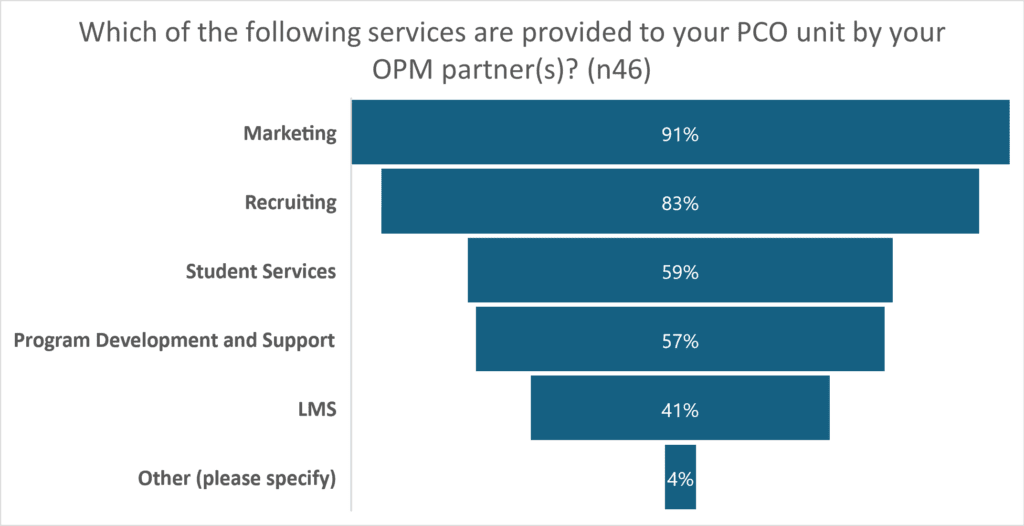OPMs: Partners in Online Education

By Stacy Chiaramonte
The Online Program Management (OPM) market is undergoing significant change. The Department of Education has stated that they would engage in negotiated rulemaking on Third-Party Servicers, and individual states, such as Minnesota, are taking action to ban revenue share agreements ahead of any federal direction. This has sparked concern about the future of OPM partnerships with institutions. While these concerns are understandable, it is crucial to examine the broader context and the benefits that OPMs continue to offer.
OPM providers generally have deep expertise in marketing and best-in-class enrollment strategies that institutions often lack. They provide funding for advertising and promotion, as well as robust marketing strategies. Generating interest among prospective students can be expensive, and institutions need to differentiate themselves in a crowded online marketplace. OPMs have historically taken on the financial risk to help institutions enter the online marketplace and then assists to generate new student enrollments through comprehensive marketing and recruitment plans. A 2023 study by UPCEA and InsideTrack, titled “Looking Toward the Future: Enrollment Strategies and Evolving Expectations of Potential Inquirers,” found that 40% of prospective student inquiries go unanswered. This is concerning, given how quickly prospective students make decisions, especially at the graduate level. OPMs have the talent and infrastructure to respond to inquiries, typically on the same day, and their ability to provide timely responses can significantly impact enrollment outcomes.
OPMs are often tapped to help students succeed in their online program. In these instances, the OPM has a dedicated team of student success managers who leverage technology, such as customer relationship management (CRM) systems, to monitor student progress, help students to navigate their institution, assist with course registration, and intervene if a student is off-track. Colleges and universities may struggle to dedicate and deploy the same resources, both in terms of personnel and technology adoption. By augmenting institutional capabilities, OPMs help the institution to enhance student retention and completion rates.
The OPM/Institution Partnership
Colleges and universities have been using OPMs to grow their online programs for nearly two decades. According to research from Eduventures published in Unbound in spring 2018, the number of institutions contracting with OPMs grew by 130% between 2011 and 2015. While the exact number of OPM partnerships is not clear, the US Government Accountability Office reported 550 colleges and universities working with an OPM to support at least 2,900 programs as of July 2021. This growth indicates the value and trust that many institutions place in OPM partnerships.
A snap poll conducted by UPCEA among its membership in December 2023 and January 2024 found that of the 115 respondents, 48% had current OPM partnerships. Of those without current partnerships, 29% had previously partnered with OPMs. The poll revealed that the most common services provided by OPMs are shown in the chart below.

Source: UPCEA Snap Poll
Institutions most often partner with OPMs for marketing and recruiting, though many also need support in student services, program development, and learning management systems. While contracts can often be long (7 to 10 years in my experience) and include varying levels of revenue share (35% to 65% based on our RFP process), OPMs only succeed if they deliver for the institution. They need to attract and nurture qualified applicants for the institution which makes the admissions decisions. OPMs are paid only when students enroll and successfully complete courses, ensuring both parties are invested in student success.
It’s important to note that institutions have ended their partnerships with OPMs over time. Many institutions initially partnered with OPMs to develop their own infrastructure for offering online programs. Once that was established, those contracts were not renewed. Several institutions I spoke with took this path and felt positive about both their initial decision to partner and the way the partnership ended, demonstrating how OPM partnerships can be tailored to the evolving needs of institutions.
My OPM Experience
My former institution began exploring OPM partnerships in 2018. Initially, I did not believe we needed a partner. We already had a robust suite of online graduate programs with strong marketing, recruitment, enrollment, and student success services. I also did not think our academic departments had the appetite for the growth that an OPM would help generate. However, the Provost felt the time was right to explore a partnership, so we undertook an RFP process in 2019 and selected two different OPM partners in 2020.
The partner selection process was particularly important and detailed for us. It took us 18 months. Ultimately, I became a supporter of partnerships for two major reasons: the market research and external perspective helped us launch a program my unit had been championing for over two years, and we needed marketing support in terms of both creativity and advertising budget. External expertise can be invaluable in identifying new opportunities and strategies.
My experience with our OPM partners was quite positive. Both provided us with marketing and recruiting, with one partner also providing student success support. We had structured agreements with clear key performance indicators (KPIs) that allowed either party to end the agreement if KPIs were not met. This transparency and accountability are crucial in building contracts and maintaining successful partnerships.
In both cases, my institution mutually agreed to end our OPM relationships before the contract term because KPIs were not being met for assorted reasons. In one case, our partner advocated for us to lower tuition to be more competitive with other institutions, contrary to what many believe about OPMs, and we did not do so. They felt that was a limiting factor to long-term success.
Despite ending the relationships early and having invested significantly in marketing, both partners were incredible in their support of off boarding our programs. They provided all the marketing and recruiting assets developed for us to use moving forward, as well as a warm hand-off of prospective students in the pipeline for our enrollment team to nurture. They were flexible throughout the transition, with a clear focus on the student experience. This level of support during transitions is a testament to the professionalism and commitment of OPM partners.
I cannot stress enough that while the OPM industry is in flux right now, whether a student is recruited through an OPM or directly through the school, their path to completion is the same. It’s the college or university’s responsibility to ensure that path is clear. If the OPM partner provides student success services, the institution may have to absorb that responsibility, but otherwise, the experience should be seamless for the student. OPMs and institutions have ended partnerships amicably and successfully for as long as they have existed. Despite ending both partnerships, I would readily work with either of our previous OPM partners again in the future. I found them to be true partners who cared about both our institution and the students we served. My experience demonstrates the potential for long-term relationships and collaboration between OPMs and institutions.
Stacy Chiaramonte is the Senior Vice President of Operations and Strategy for UPCEA’s Research & Consulting division. Prior to joining UPCEA, she spent 13 years at Worcester Polytechnic Institute, most recently as the Associate Vice President of Graduate and Professional Studies.
Learn more about UPCEA's expert consultants.
Do you need help with your PCO unit or campus? We can help. Contact UPCEA Research and Consulting for a brief consult. Email [email protected] or call us at 202-659-3130.
Trusted by the nation's top colleges and universities, UPCEA Research and Consulting provides the best value in the industry today. UPCEA's industry experts have years of experience in Online and Professional Continuing education - put them to work for you!
UPCEA Research and Consulting offers a variety of custom research and consulting options through an outcomes-focused pricing model. Find the option(s) that best suit your institution.
Learn more about UPCEA Research & Consulting
The UPCEA Difference
Unmatched Experience: For more than 100 years, UPCEA consultants have exclusively served the needs of online and professional continuing education programs. UPCEA consultants leverage their extensive industry expertise to expedite solutions, anticipate upcoming shifts, and offer distinct best practices, effectively aiding clients in achieving their goals.
Cost Effectiveness: As a nonprofit, member-serving organization, we provide unmatched value, allowing you to maximize limited research and consulting budgets.
Action in Motion: Our cadre of experienced, skilled authorities and expert practitioners propels you forward, translating research and consulting into impactful implementation, a distinctive hallmark of UPCEA. Our team of current and former institutional leaders will support you, turning research and consulting into action.
Mission Alignment: Like you, our mission is to enhance and expand educational opportunities and outcomes for adult and other non-traditional learners. We share your values and work in partnership with you to advance access and excellence in education.
